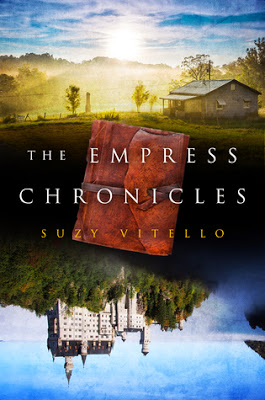 I admit that this book put me in a bit of a spin, when I’d finished it. I had no idea how to talk about it. Magical realism? Historical fiction? Problem novel? The line between what was, and what wasn’t was… a little shaky. The pacing was very gradual, especially at the beginning, and the conclusion… didn’t leave me with much of a conclusion. Looking it up, I realized that it was a first in a series, which answered some questions, as to why it felt so slow to me — the author will finish up the story elsewhere — but it seemed a good idea that didn’t receive the polish it needed in its first iteration. Nevertheless, this is a richly detailed cultural experience, and quite a tale of mental health and individual power to change things.
I admit that this book put me in a bit of a spin, when I’d finished it. I had no idea how to talk about it. Magical realism? Historical fiction? Problem novel? The line between what was, and what wasn’t was… a little shaky. The pacing was very gradual, especially at the beginning, and the conclusion… didn’t leave me with much of a conclusion. Looking it up, I realized that it was a first in a series, which answered some questions, as to why it felt so slow to me — the author will finish up the story elsewhere — but it seemed a good idea that didn’t receive the polish it needed in its first iteration. Nevertheless, this is a richly detailed cultural experience, and quite a tale of mental health and individual power to change things.
Summary: Liz’s mom has… kind of had it. Her OCD has spiraled out of control, and the constant washing/counting/tidying thing, which culminated in Liz spending some time in a facility and in the hospital, has brought her to the conclusion that Liz needs to spend time with her dad. With her DAD!? With the fake farmer and his much younger girlfriend, on their farm?! This is a good option for Liz who so wanted things to be clean that she mixed up bleach and ammonia to wash her HAIR!? Um… no. This isn’t the best option. Liz’s mom is abandoning her — and Liz knows it. But, it’s hard to admit. It’s hard to admit anything – even to her psychiatrist, who is quietly despairing of her, Liz feels sure. When, in a sympathetic moment, her doctor shares with her the battered diary of a relative – one Elizabeth (Sisi) of Bavaria, for some reason, Liz becomes enthralled. Here was someone, the doctor says, who a hundred and fifty years ago also had food disorders, also struggled to control her world, and find her place within it. Liz wants to learn from this girl, who became Empress of Austria — and more than that, Liz wants to understand. She goes to great lengths to find the diary – and to find the woman within it. The longing for connection creates a path where there was none before – helping Liz to heal, and helping Sisi to change history… maybe.
Peaks: This novel has the earmarks of a richly detailed fairy tale – a locket, a diary, an unrequited love. There’s much to enjoy in the historical detail of this novel – fox hunts, ball gowns, jewelry, tapestry, home furnishings. The setting, at least of the historical novel, is rich and lush, as opposed to the modern side of a farm outside of Portland. There is also detailed historical note of practices, including a rather grisly fox hunt. On the modern side, detail is also lavished on OCD, on the disturbing feelings and routines Liz becomes locked into – there’s a lot of detail to engage the reader here.
 Valleys:Despite a promising premise, at times, it felt like I was reading two different novels – and I was – but I couldn’t easily tell why the two novels were in the same cover, and not simply two different books. The two different voices varied by chapter, and there were times I didn’t want to leave one storyline and go to the next. For me, one was engaging and vital, the other, I had no idea what it was about, or why I should care. I didn’t get a strong sense of connection between the modern character, whose OCD obsessed and consumed her, whose abandonment, at the hands of her mother, must have been crushing and terrifying — and whose pothead, ineffectual father and his immature but blandly kind hippie girlfriend were the WORST people with whom she could have been left – and the self-obsessed royal, who was childish and short-sighted, mooning after her bodyguard, and seemed willfully blind to her situation. When Liz takes risks to break out of her world, for the sake of her sort-of step brother (what do you call the little brother of your father’s very young girlfriend?), the reader is confused at his role: is he the love interest? Is he the catalyst for her getting better? Why is he in the novel? When Sisi is simply carried along in her life, the reader wonders, why do I care? Eventually, most questions are answered, but possibly not in a timely enough manner for many readers.
Valleys:Despite a promising premise, at times, it felt like I was reading two different novels – and I was – but I couldn’t easily tell why the two novels were in the same cover, and not simply two different books. The two different voices varied by chapter, and there were times I didn’t want to leave one storyline and go to the next. For me, one was engaging and vital, the other, I had no idea what it was about, or why I should care. I didn’t get a strong sense of connection between the modern character, whose OCD obsessed and consumed her, whose abandonment, at the hands of her mother, must have been crushing and terrifying — and whose pothead, ineffectual father and his immature but blandly kind hippie girlfriend were the WORST people with whom she could have been left – and the self-obsessed royal, who was childish and short-sighted, mooning after her bodyguard, and seemed willfully blind to her situation. When Liz takes risks to break out of her world, for the sake of her sort-of step brother (what do you call the little brother of your father’s very young girlfriend?), the reader is confused at his role: is he the love interest? Is he the catalyst for her getting better? Why is he in the novel? When Sisi is simply carried along in her life, the reader wonders, why do I care? Eventually, most questions are answered, but possibly not in a timely enough manner for many readers.
I had further questions about the magical realism — the mysterious writing in Liz’s blank journal is never explained, or are the mechanics of other quasi-magical occurrences. There are quite a few loose ends – especially in the novel’s conclusion. The historical tale leaves off just as Sisi is informed that her life will never be the same… and Liz, whose actions have both influenced the past and the future, is suddenly left teetering. It’s hard to see exactly why she’s suddenly just fine, and stable enough for the narrative to wrap up and leave her. So much is left unfinished and yet both storylines feel equally portentous and loaded — primed to go off, but never getting there. Still, those seeking what promises to be an absolutely epic historical series will engage with this and drink it down, and wait eager for the next.
I received an advanced review copy courtesy of the publisher. You can find THE EMPRESS CHRONICLES by Suzy Vitello online, or at an independent bookstore near you!